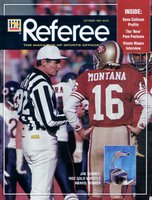To Replay or Not to Replay
 Instant replay has been a hot topic of conversation this season and the Pac-10 is still grappling. Jim Tunney was an NFL official for 31 years. He refereed 29 post-season games including three Super Bowls and worked some of the most famous games in history "The Ice Bowl", "The Kick", "The 100th Bears-Packers Game", "The Snowball Game", the "Final Fumble", "The Fog Bowl" and "The Catch".
Instant replay has been a hot topic of conversation this season and the Pac-10 is still grappling. Jim Tunney was an NFL official for 31 years. He refereed 29 post-season games including three Super Bowls and worked some of the most famous games in history "The Ice Bowl", "The Kick", "The 100th Bears-Packers Game", "The Snowball Game", the "Final Fumble", "The Fog Bowl" and "The Catch".By: Jim Tunney
Pardon the intrusion Mr. Shakespeare, but since the National Football League Instant Replay system is now 21 years of age, so I thought you wouldn't mind that liberty. Yes, 21! Instant Replay was implemented during the 1986 NFL season. The television audience enjoyed the luxury of seeing the play from three or four different angles for years before the League decided to use it. It's not perfect which serves as a reminder that the replay system used by the NCAA is in its infancy. Errors will happen as they did in the Oklahoma at Oregon game on September 16, 2006.
It is easy to forget that the NFL had its share of "glitches" in its infancy. We need to be patient, if we believe the replay system is here to stay. But back to that Oklahoma vs. Oregon game.
With little time left in the 4th quarter and Oregon trailing, the Ducks attempted an on-side kick. The ball was recovered by Oregon after touching an Oklahoma player. The question was: Did the kicked ball touch an Oregon player first? If it did, it's a short free kick and Oregon must kick again or Oklahoma could take the ball at the spot of first touching by the Oregon player, which, of course, Oklahoma would do.
It is difficult to fault the on-field crew of officials for "missing" the spot of first touching. An on-side kick is a "fire drill" with a dozen or more players scrambling to get the ball. While the on-field officials are always on the alert to see who touches the ball first, they are often blocked out.
I believe the glitch lies in the instant replay booth. A team of three or four coordinates every replay situation and needs to 1) take the necessary time to get it right and 2) be sure they see all available camera angles. It is my understanding the replay official did not get the angle necessary.
During the scramble for the ball an on-field official blew the whistle early (inadvertent) thinking an Oregon player recovered the kicked ball after it went 10 yards. However, the ball squirted out of the Oregon player's grasp and was recovered by an Oklahoma player. The officials gave the ball to Oregon. Was that call prejudicial? Did the officials intentionally favor Oregon?
Following the recovery, Oregon threw a pass that was deflected by an Oklahoma player at the line of scrimmage. Then an Oklahoma player was called for defensive pass interference. Oregon went on to score and won the game 34-33. Was the defensive pass interference prejudicial? Why didn't the on-field officials see the "touching" of the pass? Why didn't the replay officials see the touching and over rule the no-call on the field? Were those errors prejudicial? Did the Pac 10 crew show favoritism to the Oregon team?
I don't believe so. I worked at the NCAA level for several years, which included intersectional games. In those days we had a split crew: 2 or 3 from each conference. I have never been in any crew where ANY official showed favoritism to a team or his conference. Officials don't care who wins!
The perception that favoritism is present often overrides the impartiality of officials. These are honest men who want to do their best. Fairness - not winning - is their goal.
However, if the NCAA wants to eliminate the perception of partiality then I suggest they assign crews (of seven) as they do for post-season games. Assign a crew from another conference. In the aforementioned Oregon game, for example, assign a BIG 10 or SEC crew. Send a Pac-10crew to an intersectional in the mid west or east. That's expensive, and of concern for the NCAA.
Also the NCAA has to correct the replay equipment and its technology since they differ from conference to conference. If perfection is wanted, then the NCAA has to invest in a consistent system much like the NFL has done. The same equipment and better trained replay personnel help reduce the chance for error.
One coach said, "It's important to have non-partisan crews". Coach, all crews are non-partisan. Let me say it again, officials don't care who wins! The integrity of the game depends on the integrity of its officials.
Perhaps the "perception" of partiality is too rampant in today's "fish bowl" games. Assigning crews from out of the conferences who are playing may help.
Jim Tunney’s first book was Impartial Judgment. His latest books is It's the Will, Not the Skill describes the principles and philosophies of success that make up a winning T*E*A*M. He has co-authored and authored nine books which can be found on his website, www.jimtunney.com.






1 Comments:
i just watched the bowl game with Navy. 2 on field ref's got the goal line touch back wrong and then the replay official did not know the rule. where do you go to contact the ncaa for their statments on these mistakes. I am no fan of either team but I do feel sorry for Navy. How does one find out when the ncaa tells a team they are sorry.
Post a Comment
<< Home